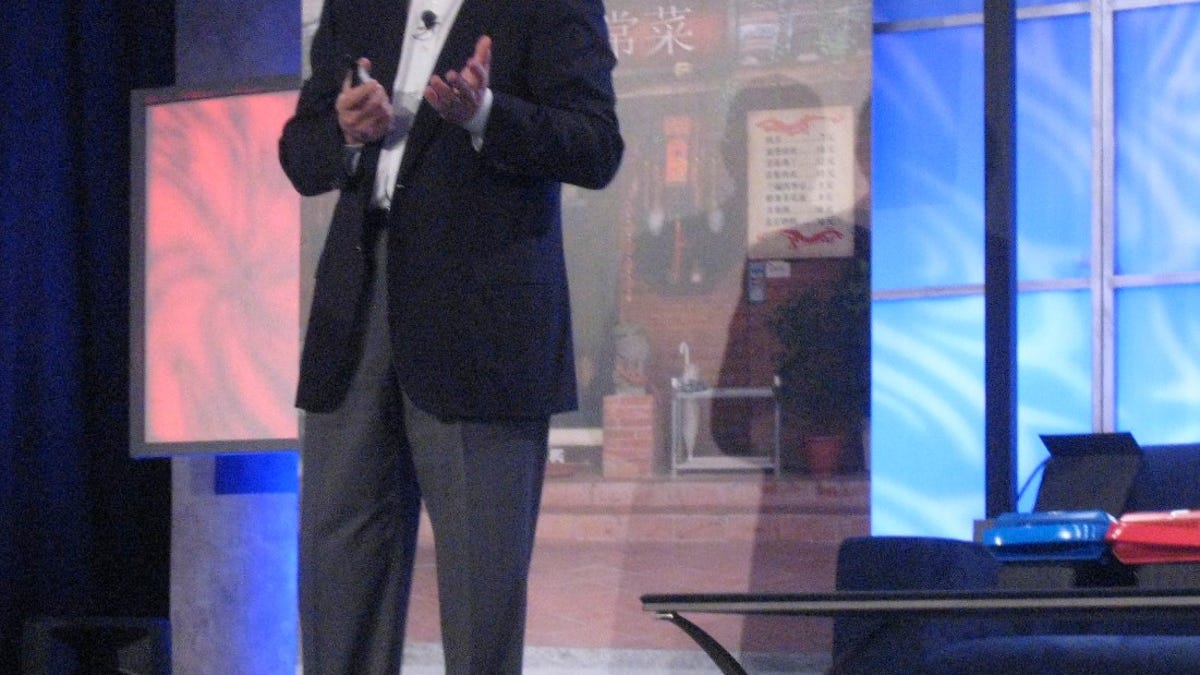Paul Otellini and his magical mystery gadget
At the Web 2.0 Summit, the Intel president and CEO showed off a number of new internal prototypes and said that regardless of economic climate, a relentless pursuit of innovation is critical to the tech industry.

SAN FRANCISCO--There is a light at the end of the dark financial tunnel, Intel President and CEO Paul Otellini said onstage at the Web 2.0 Summit on Thursday morning. And he brought out a shiny new toy to prove it.
"All the smart people I've talked to in this area suggest that the U.S. is in a two- to three-quarter recession," Otellini said, though he added that the current economic slowdown is "the deepest one I've seen in my lifetime" and predicted that morale may stay low for longer because unemployment may remain high even after growth has resumed.
The point of his talk, though, was to focus on the good stuff, namely the innovation that will still be on the way regardless of how far the markets fall. "I like coming here," Otellini said of the Web 2.0 conference. "It's a respite from, sort of, watching the stock market crash every day, and think about what the future is going to hold for us."
Otellini showed off two projects that the company is working on internally. One of them is a business-networking software product that Otellini said will make a big difference in how employees of large corporations socialize and network with one another, learn more about the company, and collaborate on products. In a demonstration of the prototype, the CEO suggested that it was something that could eventually make a difference for many companies.
"There's an interesting thing about businesses and software," he said. "They pay for it. If you're looking for a business model that might be interesting, finding a way to capture the needs of enterprises...is a pretty good way of making a living."
But the more impressive of the two demonstrations was a shadowy, unnamed handheld gadget that's so early in its development that Otellini admitted it had to be powered by computers backstage. Otellini showed how the always-connected device, which resembled an iPhone and which Intel has shown off a few times before, could use a "smart" camera to translate Chinese text into English almost instantly, and gain product information and reviews when hovering over a toy for sale. With no release date, it was effectively the mobile gadget world's equivalent of a slick concept car at an auto show.
But it hasn't been all fun, games, and shiny toys for Intel recently. He admitted that the aforementioned mystery concept gadget would require "a really good, first-class broadband infrastructure around the world." Intel's support of the always-just-a-milestone-away WiMax technology is one of the company's biggest challenges, and critics have been skeptical of the company's reliance on WiMax's success in its projections for the future.
Additionally, Intel supplies the chips for Apple's desktop and laptop machines, a landmark partnership that has been several years running now. But the relationship became strained recently when Intel started holding up Apple's iPhone as a device that suffers technologically from not having one of its chips in place.
Otellini generally avoided talking about this, saying that he sees huge potential in the iPhone--"Our phones started ringing the day after the iPhone was launched"--as well as other mobile technologies in general. Beyond a few ambiguous words about the iPhone, he was mum on Apple.
In conclusion, Web 2.0 Summit co-host John Battelle of Federated Media brought up a quotation from former Intel Chairman and CEO Andy Grove, "only the paranoid survive," and asked Otellini to reflect on the statement and what he was afraid of.
"(Grove) said that to reflect, to some extent, the risk characteristic of our business, of our industry," Otellini said. "There's always a new technology that's potentially disruptive to your entire business model. What he was worried about was something coming up to disrupt it...I try to live by that."

